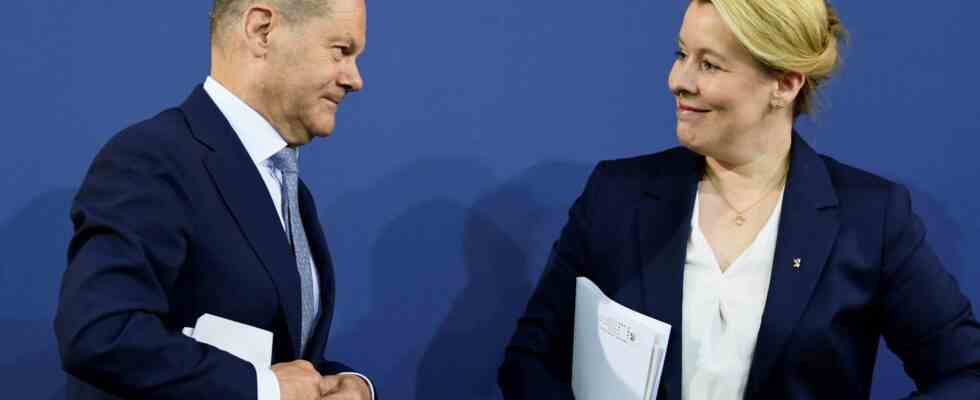analysis
Status: 03.06.2022 00:08
It was the first meeting between the Prime Ministers and the Federal Chancellor in person. The ongoing issue of Corona remains, but everyone is worried about how the energy supply will continue.
The row of polished bodies in front of the Chancellery is the unmistakable sign that something is different than in the past Corona years: The Prime Ministers are meeting again in person in the Chancellery. While the drivers outside have to endure the smell of grilling in the nearby beer garden, inside, all country managers are sitting together in one room for the first time.
“It was great, even if it was a bit tight,” the Chancellor will say later. Most of them are happy about it. According to Olaf Scholz (SPD), the meeting “encouraged” the deliberations. Later, Olaf Scholz, Franziska Giffey and Hendrik Wüst announced the results in a press conference.
No back and forth in the pandemic
One no longer wants to “back and forth” with Corona, says NRW Prime Minister Hendrik Wüst (CDU) and further that there should be no more daycare and school closures in autumn. Anyone who wants to find out more concrete information about measures and plans for the presumably imminent pandemic autumn, against which Federal Minister of Health Karl Lauterbach (SPD) warns, will be disappointed today.
Chancellor and country heads want to wait and see the reports from the crisis team and the expert commission, evaluate them and learn from them. There was agreement not to make any hasty decisions, which is why there are no proposals today, said the Chancellor. You are now on “summer tires” and then have to see which “winter tires are needed in the fall”. From the side, Berlin’s governing mayor Franziska Giffey (SPD) says: “Or snow chains.”
Mood good – situation serious
The press conference in the Chancellery could also be headlined: We’ll take care of it. This applies above all to the increased energy prices – which are particularly worrying for the Governing Mayor of Berlin with regard to poor pensioners throughout the republic. How can they be specifically supported? It’s important to address that, says Giffey. To whom remained unclear that evening.
Clearer are the demands not to simply stand by and watch when corporations rake in enormous profits from the crisis. Especially with a view to the mineral oil companies, Giffey hopes for the federal government. Namely to Federal Minister of Economics Robert Habeck (Bündnis 90/Die Grünen) and a cartel office that looks closely if there are price agreements between the mineral oil companies. But that is difficult to prove and can only be fined afterwards anyway.
According to Giffey, another idea comes from Bremen Mayor Andreas Bovenschulte (SPD): a profit limit for oil companies. How that could be made legally watertight also remains open tonight.
Energy security and storm damage
It can be felt that the topic of energy security is on the minds of the country heads, especially with a view to the winter of 2022/23. The Governing Mayor of Berlin emphasizes the refineries PCK Schwedt and Leuna, which are so important for East Germany. The chancellor promises: “We’ll take care of it.”
When asked how specific, Scholz lists what the federal government has already initiated, including in relation to LNG terminals, and then says: “I will not tell you what we are doing specifically here. And for that I’m sure you understand.”
Hendrik Wüst also mentions that German citizens affected by storm damage should no longer be left to their own devices in the future. Compulsory insurance against natural hazards should be introduced. How exactly this can be designed should now be examined by the federal government. Wüst apologizes after his statement, saying unfortunately he has to go now. Then Giffey calls after him: “Mr. Wüst, have a good flight, I hope everything goes smoothly at BER!” She knows her capital airport.
Standing together in the face of challenges
When asked the last question of the evening, the chancellor visibly brightened up: what was it like not speaking with a tile, but in person with “real people”? “I don’t want to downplay it at all,” says Scholz, “it was great. It was just a completely different atmosphere to meet in real life,” his eyes sparkle, his hands circle in the air, but he quickly crosses his arms and goes on to say that he believes it has created an emotional closeness and that we want to stand together as a country in the face of challenges. “It was like a family reunion.”
Finally, the chancellor said: “I think we should do something with this moment.” Maybe the enthusiasm will last until the next federal-state round.

